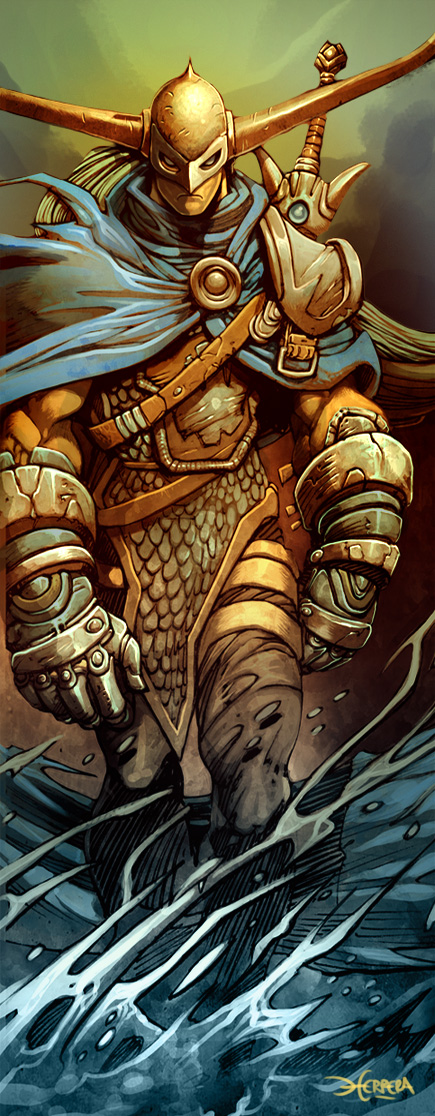 |
| Lugh inspires the very finest quality of fan art. Image by el-grimlock |
With the end of July and beginning of August rapidly approaching La Lunasa will soon be upon us and with it, well folks like me talking about it.
In terms of more mainstream "Pagan" holidays, it has been my experience that Lughnasadh often finds itself as being one that many folks are unsure of what to do with it; la fheile brigid/ Imbolc being the other. Whereas Oiche Samhana/ Samhain and lá bealtaine/Beltane remain two of the more popular feast/festival days, the others find themselves playing a sort of second fiddle.
I think it is primarily to do with the fact that each day has direct associations wih a specific deity. So, if one finds themselves not being particularly devoted to either Lugh (Tailtu, but we'll get to her later) or Brigid, then there is little impetus to celebrate, other than they are supposed to be holy days on that "wheel of the year" calendar. For GRP's, on the other hand, we've only really got the four days... so you had bloody well do something you lazy wretches!
I mean, I am certainly "closer" to Brigid, than I am to Lugh; Brigid, after all is the focus of my hearth and has the added significance of a probable functional connection to my profession. I thoroughly enjoy lá bealtaine, as it is a bright spot in an otherwise drab, freezing, somewhat miserable point in the year; February being the "heart" of winter in Toronto, such as it is. Lugh, on the other hand, I'm not remotely devoted to, strictly speaking.
Lugh was, at one point in my life a very significant deity, and in my neo-Pagan days often the centre or focus of the majority of my prayers/ meditation. Nowadays though, prayers going his way are either for specific reasons (safe travel, chief among them) or during la lunasa. Don't get me wrong, Lugh is a pretty awesome god. He has one of the most detailed and epic of all mythologies, he is all skilled, and so far as the reports from his devotee's go, a pretty nice deity all around (except, of course, if you've murdered his father). In fact the priest who married my wife and I is a devotee to him, and if the company one keeps is any indication of the quality of an individual, that he is counted among Lugh's devotees speaks volumes. I think in my youth it really was the "star power" that Lugh had which initially drew me to him, but as I progressed a bit deeper into things, I came to realize that my experiences were leading me to other, darker places.
Having said all that, La Lunasa is the one time of the year where Lugh is front and centre (other than some of the more spectacular thunderstorms which crop up around this time of year). I often find myself going over his tales a little more closely, and certainly I do enjoy my generally low key activities on the day itself.
I will generally get up early, and go to a particular local, which happens to be one on the the highest points in the region. There is a small parkette, itself a terminal portion of a trail which extends south, along the Humber River, to Lake Ontario. At this northern end, there is a very large hill, and so for the past few years I have taken it upon myself to go down into the river valley, find a nice broad stone to carry with me, and traverse up the hill to its summit. I will make a small shrine, pour out some offerings and offer prayers and song to the lord of victory. I'm going to be moving in the autumn, and so travelling distances on a daily basis are going to be much further, so this year I think a little more emphasis will be required on the safe travel aspect as well. Again, being isolated and not part of any local sporting leagues, opportunities to offer up my victories are few ad far between, but Lugh does recieve those as well.
It is also a pertinent time to reminice about our ancestors (then again, when isn't it pertinent?) and particularly their sacrifices, their struggles in which they made our coming into the world, and our lives within it, that much easier. Tailtu, the foster mother of Lugh, ought to also be given offerings and prayers. Though if you want my thoughts on her, you can find them in my La Lunasa post from last year.
Hail to the lord of Victory!
He, whose hand is far reaching
He, whose skills are many
He, whose blessings produce victory
May he continue to watch over and
guide us in our efforts to restore:
Honour to the gods!
Nobility to the ancestors!
Peace with the kindly ones!
Hail Champion!
Hail Balors bane!
Hail Lugh!
-Gorm



